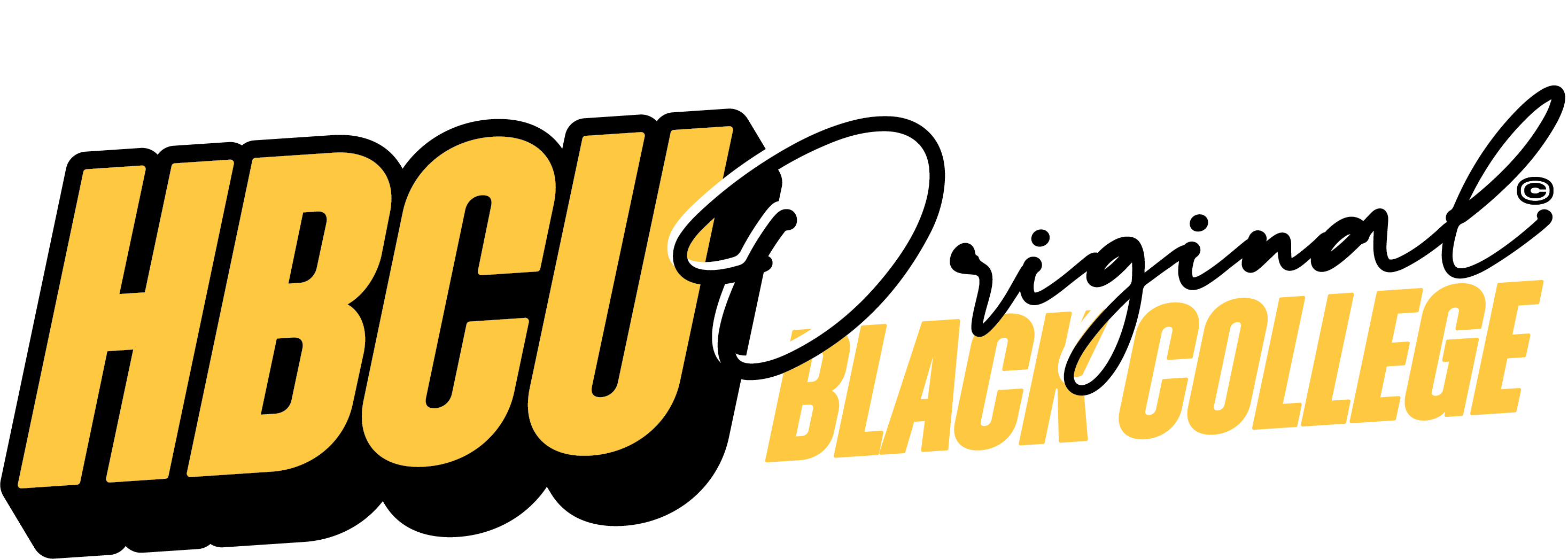HBCU ORIGINAL
Four-Time SWAC Coach of the Year Tomekia Reed Named Charlotte’s Ninth Women’s Basketball Head Coach
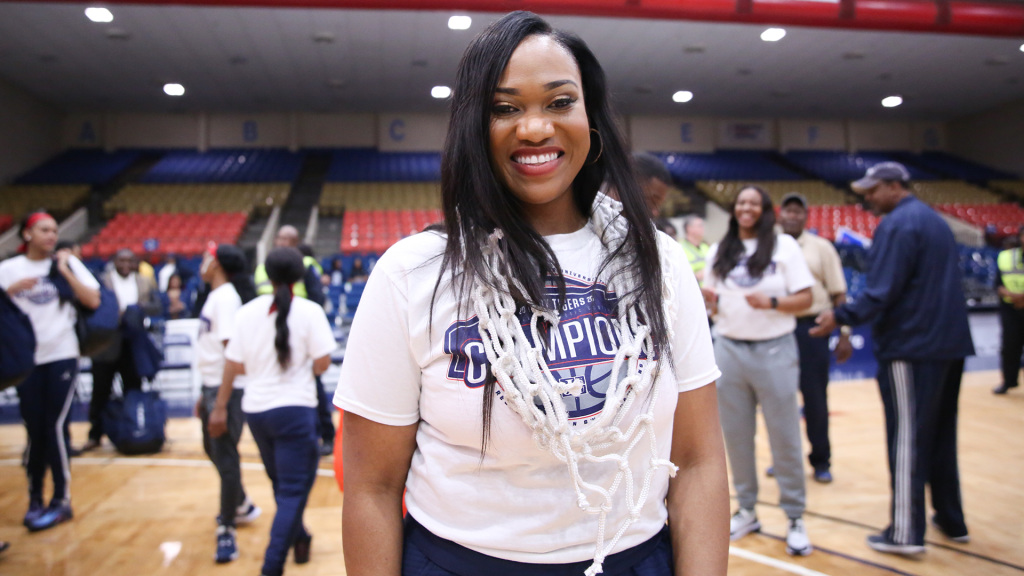
CHARLOTTE, N.C. – Tomekia Reed has been named the ninth head women’s basketball coach for the Charlotte 49ers, Mike Hill, Director of Athletics, announced on Thursday, April 25. Reed, a three-time HBCU National Coach of the Year, comes to Charlotte following a highly successful six-year stint as head coach of the Jackson State Tigers.
“Tomekia Reed is a proven winner whose passion for developing young people through the game of basketball is inspiring,” said Hill. “Her enthusiasm is contagious and will translate into even more success for her on the recruiting trail and in the community. She shares our vision for greatness, and we are ecstatic to have her lead our program!”
Reed took the program to new heights by winning five consecutive Southwestern Athletic Conference (SWAC) regular season titles and three SWAC tournament titles, including back-to-back championships in 2021 and 2022.
UNC Charlotte Chancellor Sharon L. Gaber said: “Tomekia Reed is one of the most talented young coaches in college basketball today. Throughout her career, she has demonstrated a strong commitment to excellence, both on and off the court. We are delighted to welcome Tomekia to Niner Nation.”
In making the program’s second straight appearance in the 2022 NCAA Tournament, and the first as a #14 seed, JSU led in the fourth quarter in nearly achieving a historic tournament win over #3 LSU. JSU made its return to the NCAA Tournament as a #14 seed again to face #3 UConn in 2024, where Reed won the respect of hall of fame coach Geno Auriemma.
Reed is a four-time SWAC Coach of The Year (2020, 2022, 2023, 2024). The 2020 championship was the first regular season crown for JSU since 2008, and the 2021 tournament championship earned the first NCAA Tournament appearance since 2008.
“The Gold Standard: What a powerful slogan for a university on the rise,” said Reed. “I could not be more thrilled to become a Niner. I am inspired and excited to continue the standard of excellence that is this women’s basketball program. Mike, Ragean Hill, Chancellor Gaber, and the entire athletic department family made me feel welcome. Their enthusiasm and competitiveness is contagious. This leadership’s strategic comprehensive plan aligns with my standards and plans for sustained success at the highest level. I am more motivated than ever to capitalize on the opportunity at hand in leading a winning team for both our student-athletes and the great city of Charlotte. It is a great day to be a Niner!”
This year’s mark of 26 wins set a school record, including a historic 18-0 record in SWAC play. JSU won 21 consecutive games in the calendar year 2022, the longest streak in the nation entering the NCAA Tournament.
In April 2022, Ameshya Williams-Holliday was taken with the 25th overall pick in the WNBA Draft by the Indiana Fever to become the first JSU player – and first from an HBCU – selected in the WNBA Draft. Angel Jackson, selected by the Las Vegas Aces with the 36th overall pick in the 2024 WNBA Draft, is the second JSU player drafted during Reed’s tenure.
Reed began her collegiate playing career at Southern Miss, helping lead the program to a WNIT appearance before transferring to Hinds Community College for the 2000-01 season. At Hinds, Reed led the Mississippi Association of Community and Junior Colleges (MACJC) in rebounds per game and was second in the conference in scoring. She was chosen as an All-State first team selection. She earned an associate degree in sports medicine from Hinds in 2001 and a bachelor’s degree in exercise science from Georgia Southwestern in 2003.
As a head coach, Reed holds an overall record 125-54 including a 95-10 conference record, coming off three consecutive 20+ win seasons. Her JSU team has the fourth highest conference winning percentage over the last five seasons at 95.4%.
Her coaching career began in 2006 as JSU’s recruiting coordinator, serving in that role until 2009 before taking the same position for the Louisiana Ragin’ Cajuns. From 2010 until 2015, Reed had recruiting coordinator stops at Southern Mississippi, Louisiana Tech, and New Orleans. Her first head coaching opportunity came in 2015 at her alma mater, Hinds CC.
Charlotte women’s basketball is coming off their first season competing in the American Athletic Conference. The Niners won nine AAC games on their way to earning the sixth seed in the conference tournament.
An introductory press conference will be scheduled for Monday April 29 in the student-athlete lounge in Halton Arena at 2:00p.m.
HBCU ORIGINAL
New HBCU on the Block!

Huston-Tillotson University Launches New HBCU Hub in California
Huston-Tillotson University, a prominent Historically Black College and University (HBCU) based in Austin, Texas, has made a groundbreaking move by establishing a new HBCU hub in California. This initiative aims to expand educational opportunities, foster innovation, and build a robust community network for students and alumni on the West Coast.
A Vision for Expansion
The new HBCU hub in California is designed to serve as a comprehensive center for education, research, and community engagement. By extending its reach beyond Texas, Huston-Tillotson University seeks to provide more students with access to its high-quality academic programs and resources, while also creating a space for cultural exchange and professional development.
“Expanding to California allows us to better serve our students and alumni to who are spread across the country,” said Dr. Colette Pierce Burnette, President and CEO of Huston-Tillotson University. “This hub will enable us to offer more opportunities for collaboration, innovation, and community building, which are core to our mission.”
Programs and Initiatives
The California hub will host a variety of programs aimed at supporting students academically and professionally. Key initiatives include:
- Academic Support and Tutoring: Providing academic resources and tutoring services to help students excel in their studies.
- Career Development: Offering workshops, internships, and networking events to prepare students for successful careers in various fields.
- Community Engagement: Organizing cultural events, community service projects, and public lectures to foster a sense of community and social responsibility.
- Research and Innovation: Facilitating research projects and partnerships with local businesses and organizations to drive innovation and address regional challenges.
Strategic Location
California was chosen for the new hub due to its diverse population and strong economy, which offers ample opportunities for partnerships and growth. The state is home to a significant number of HBCU alumni and students, making it an ideal location for expanding Huston-Tillotson’s presence and impact.
The hub will be located in the Greater Los Angeles area, a strategic choice that provides easy access to major industries, cultural institutions, and other educational establishments. This location will enable Huston-Tillotson to build meaningful connections with local communities and stakeholders.
Strengthening the HBCU Network
The establishment of the California hub is part of a broader effort to strengthen the HBCU network across the United States. By creating additional hubs in key regions, Huston-Tillotson University and other HBCUs can collaborate more effectively, share resources, and amplify their collective impact.
“The creation of this hub is a testament to our commitment to expanding the reach and influence of HBCUs,” said Dr. Wayne A. I. Frederick, President of Howard University. “By working together and supporting each other, we can ensure that our students receive the best possible education and opportunities, no matter where they are located.”
Community and Alumni Support
The response from the community and alumni has been overwhelmingly positive. Many see the new hub as a crucial step in providing more comprehensive support to current students and engaging alumni in meaningful ways.
“This hub is a game-changer for our alumni on the West Coast,” said Jacqueline Jones, a Huston-Tillotson alumna based in San Francisco. “It gives us a place to connect, collaborate, and contribute to the success of our alma mater and the next generation of students.”
Looking Ahead
As Huston-Tillotson University prepares to launch its new California hub, the excitement and anticipation are palpable. This initiative promises to bring new opportunities for students, foster innovation, and strengthen the sense of community among HBCUs.
The launch event, scheduled for later this year, will feature keynote speakers, panel discussions, and networking sessions, highlighting the hub’s mission and vision. This milestone marks a new chapter in the university’s history, underscoring its commitment to excellence, inclusivity, and community engagement.
HBCU ORIGINAL
HBCU All-Stars Embark on Historic International Tour to Paris, France!


In an exciting development for collegiate athletics, the HBCU All-Stars are set to embark on an international tour to Paris, France, taking place June 19-26. This initiative aims to showcase the exceptional talent of student-athletes from Historically Black Colleges and Universities (HBCUs) on a global stage, fostering cultural exchange and providing invaluable experiences for the players.
A Milestone in HBCU Athletics
The HBCU All-Stars International Tour marks a significant milestone in the history of HBCU athletics. This team is composed of ten former HBCU All-Stars who will be traveling internationally to compete in Paris’ QUAI 54 World Streetball Championship and Friendly Exhibition Games. By competing internationally, these student-athletes have the opportunity to gain exposure, experience different cultures, and engage with a broader audience.
“This tour represents a unique opportunity for our student-athletes to showcase their talents on an international stage,” said Dr. Charles McClelland, Commissioner of the Southwestern Athletic Conference (SWAC). “It’s a testament to the hard work and dedication of these young men and women, and it reinforces the global impact of HBCUs.”
What Are They About
To understand how groundbreaking this international competition is, we must start with their story. The All-Star Game is a basketball game that showcases the best HBCU players in the country across several divisions. This annual game recently took place on Sunday, April 7, and was broadcast live on the CBS Television Network. Team Ben Wallace triumphed over Team Rick Mahorn with a final score of 108-97. Team Wallace player and MVP, Dhashon Dyson of Bethune-Cookman, knocked down five three-pointers and scored 19 points overall in the game.
Apparently, these North American coasts cannot contain the talent showcased by these young men. Shortly after the third annual game, the HBCU All-Stars announced they would be taking their skills internationally. Their 2024 roster features HBCU All-Stars from 2022-2024.
The 2024 HBCU All-Star International Team Roster:
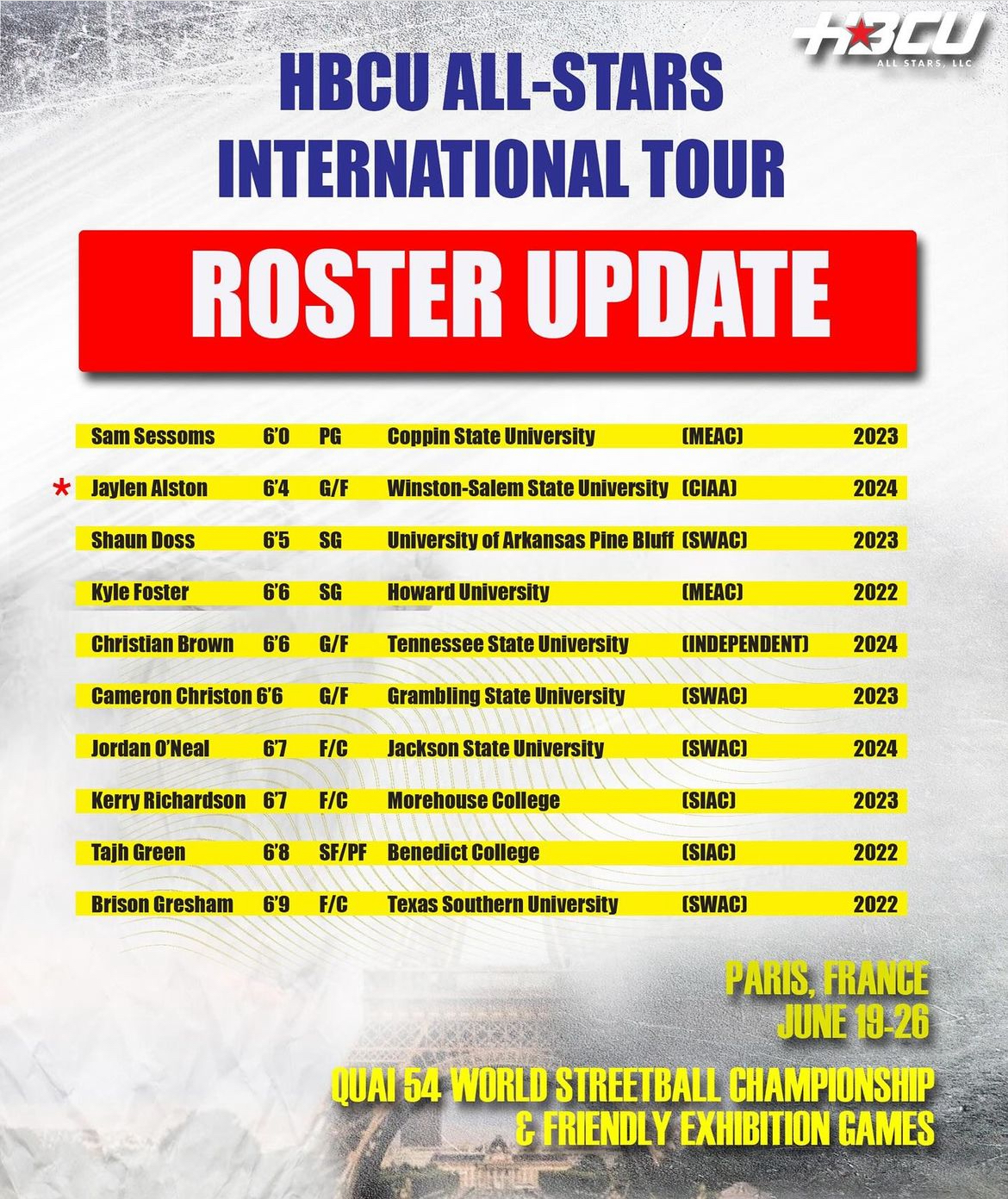
Sponsorship and Support
The tour has garnered significant support from various sponsors, including major corporations and alumni associations. These partnerships have provided the necessary funding and resources to ensure the success of the tour.
“We are grateful for the support of our sponsors, who recognize the importance of this initiative,” said Dr. Wayne Frederick, President of Howard University. “Their contributions have made it possible for our student-athletes to embark on this journey and represent our institutions with pride.”
Tour Highlights and Itinerary
The HBCU All-Stars will spend their time in Paris participating in a series of exhibition games against top European university teams. The tour will also include various events where players can interact with local fans and students and engage in community service activities, including basketball clinics for local youth, fostering goodwill and cultural exchange.
Looking Ahead
As the HBCU All-Stars prepare for their international tour, the excitement and anticipation continue to build. This historic event promises to be a transformative experience for the student-athletes and a pivotal moment in the ongoing effort to elevate HBCU athletics.
The tour is not only a celebration of athletic excellence but also a testament to the resilience, talent, and potential of HBCU students. It serves as a reminder of the rich history and contribution of HBCUs to the broader landscape of higher education and sports.
HBCU ORIGINAL
Howard University Cuts Ties with Sean “Puffy” Combs Amid Controversy!


In a significant move, Howard University has officially severed its ties with renowned music mogul Sean “Puffy” Combs. This decision follows recent allegations of misconduct against Combs, marking a notable shift in the relationship between the university and one of its most high-profile supporters.
Howard University announced its decision to revoke the honorary Doctor of Humanities degree it awarded to Combs in 2014. This decision was not taken lightly, considering Combs’ long-standing relationship with the university and his substantial contributions to its community. The university also decided to return a $1 million donation made by Combs in 2022, which was intended to support scholarships and various university initiatives.
“The Diddler”
Sean Combs, also known by his stage names Puff Daddy, P. Diddy, and Diddy, has been a significant figure in the music industry for decades. His connection to Howard University dates back to the late 1980s when he attended the university before leaving to pursue a career in music. Despite not completing his degree, Combs maintained a close relationship with Howard, often referring to it as the place where he “found himself” and laying the groundwork for his illustrious career.
The decision to cut ties comes in the wake of serious allegations against Combs. Several women have come forward with accusations of sexual misconduct, which have led to public scrutiny and legal action. Amid these allegations, security camera footage has surfaced showing Combs allegedly punching, kicking, and throwing objects at former artist and girlfriend Cassie. Combs has since issued a public apology, which was not well-received by Cassie’s attorney or fans. These allegations have not only tarnished Combs’ personal reputation but also posed a dilemma for institutions associated with him.
The Howard University’s Statement
In a statement, Howard University emphasized its commitment to creating a safe and respectful environment for its students and staff. The university stated, “Howard University holds its students, faculty, and community to the highest standards of ethical conduct. The allegations against Mr. Combs are serious and, as an institution dedicated to the pursuit of truth and justice, we must take decisive action.”
The statement continued, “We have a responsibility to our community to ensure that our values are upheld. Therefore, we have decided to revoke the honorary degree awarded to Mr. Combs and return his donation. This decision reflects our commitment to maintaining the integrity and safety of our academic environment.”
What the People Think
As expected on Beyoncé’s internet, many people have strong opinions on this topic and how Howard University has handled these claims. While many applaud the university for taking a stand against alleged misconduct, others have expressed disappointment, citing Combs’ contributions and support over the years. This decision underscores the complex nature of navigating allegations of misconduct involving prominent figures. The move by Howard University is likely to influence other institutions and organizations associated with Combs, prompting them to reassess their affiliations and the potential implications of maintaining such relationships.
Moving Forward
As Howard University distances itself from Sean “Puffy” Combs, it reinforces its commitment to ethical standards and the well-being of its community. The university’s decisive action highlights the importance of accountability and the need for institutions to align their values with their actions, even when it involves high-profile supporters.
This development serves as a reminder of the ongoing challenges that institutions face in addressing allegations of misconduct and the necessity of making tough decisions to uphold their principles. Howard University’s decision to cut ties with Sean “Puffy” Combs marks a pivotal moment in its history, reflecting a broader societal shift towards accountability and ethical conduct in the face of serious allegations.
Campus
Trailblazers in Technology and Science: 20 Leading HBCUs

Historically Black Colleges and Universities (HBCUs) have been instrumental in providing quality education and fostering innovation. Today, they continue to excel, particularly in the fields of technology and science. Here, we highlight 20 HBCUs that are leading the way in these critical areas.
1. North Carolina A&T State University
Renowned for its engineering programs, especially in computer science and electrical engineering. The Center for Advanced Materials and Smart Structures exemplifies its commitment to cutting-edge research.
2. Howard University
Offers strong programs in engineering, computer science, and health sciences. The Howard University Research Centers in Minority Institutions focus on advancing health disparities and technological innovations.
3. Florida A&M University (FAMU)
Known for pioneering research in agriculture, environmental sciences, and engineering. FAMU collaborates with Florida State University to provide joint engineering programs.
4. Tuskegee University
A leader in aerospace science engineering, housing the Tuskegee University Center for Advanced Materials, which develops technologies for the aerospace industry.
5. Morgan State University
Strong in engineering, computer science, and bio-environmental sciences. Home to the National Center for Transportation Management, Research, and Development.
6. Prairie View A&M University
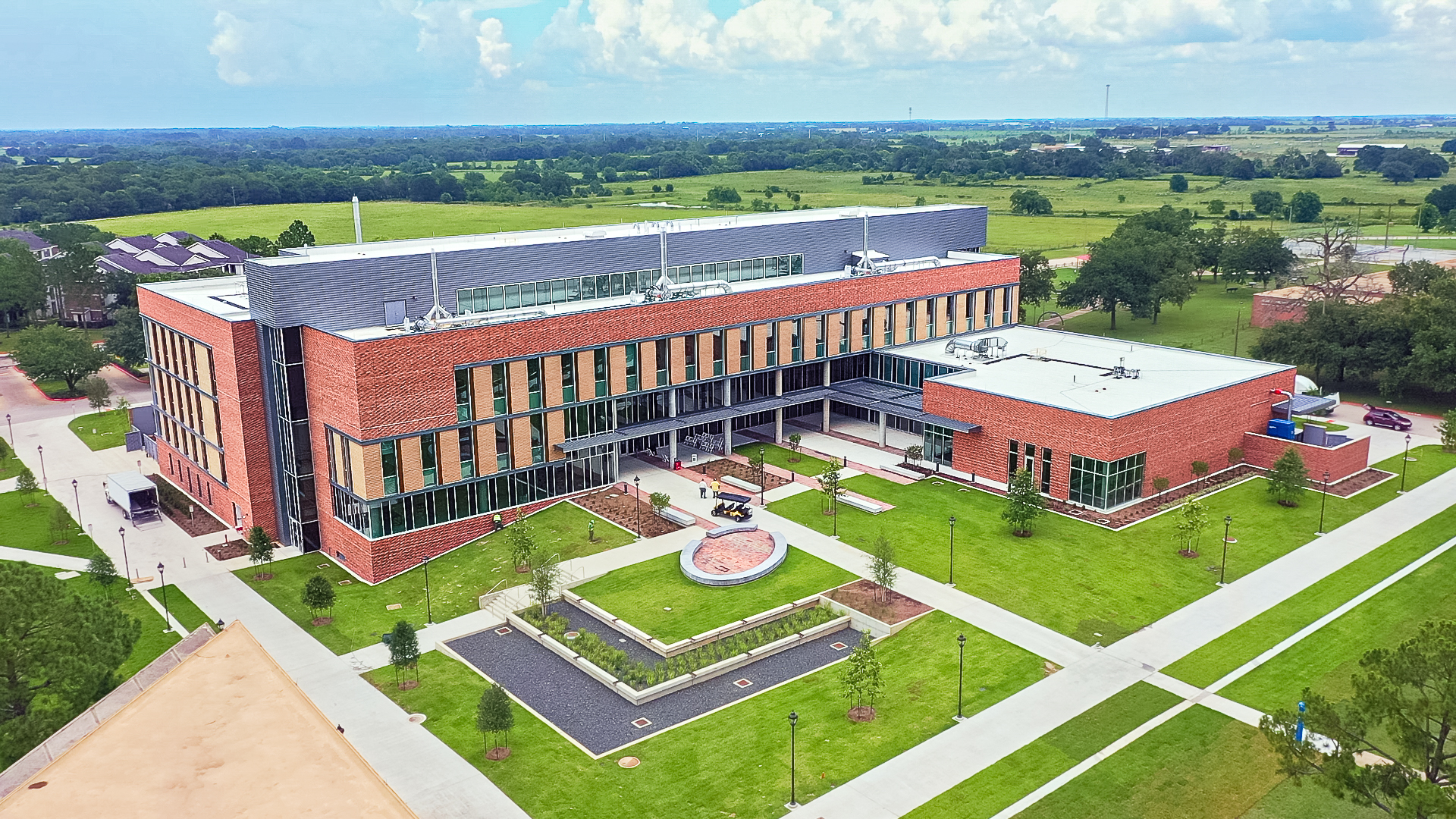
Excels in electrical and computer engineering, hosting the Center of Excellence for Communication Systems Technology Research.
7. Jackson State University
Leading in meteorology, computer science, and environmental science, with research centers focused on climate change and environmental preservation.
8. Hampton University
Offers robust programs in marine and environmental science, atmospheric science, and physics. The Hampton University Proton Therapy Institute provides advanced healthcare solutions.
9. Clark Atlanta University
Known for its biotechnology, computational science, and data analytics programs. The Center for Cancer Research and Therapeutic Development is at the forefront of cancer research.
10. Spelman College
A top liberal arts college for women, with strong emphasis on STEM education and research in environmental sciences and health disparities.
11. Morehouse College
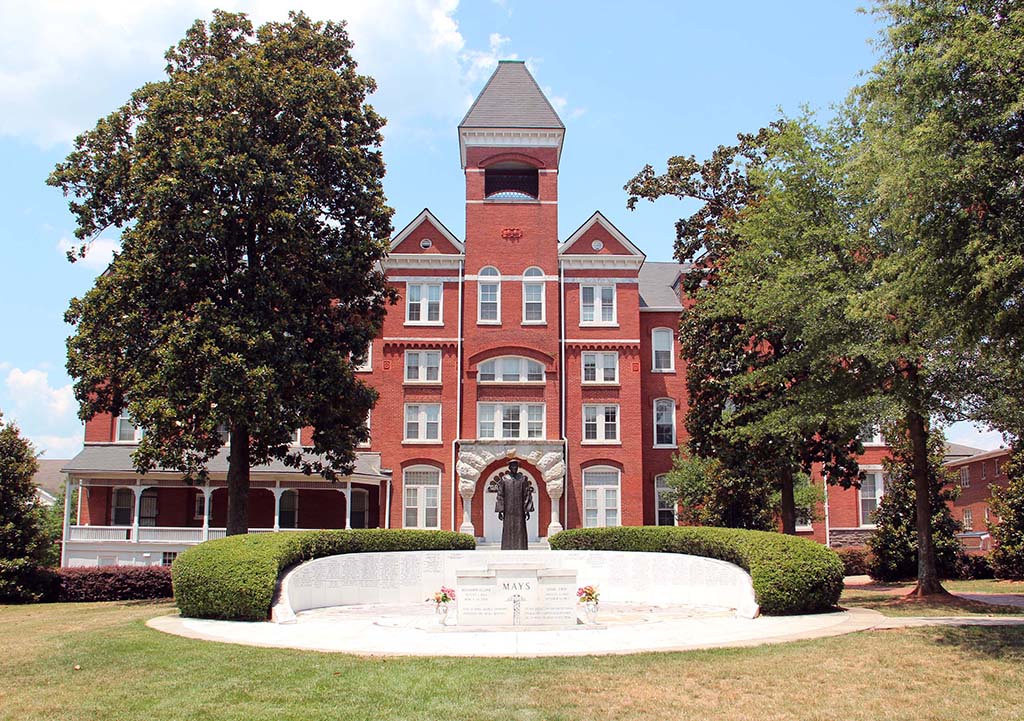
Focuses on producing leaders in STEM fields, with significant research in computer science, physics, and mathematics.
12. Xavier University of Louisiana
Excels in the health sciences, particularly in pharmacy and biomedical research. Known for producing a high number of African American medical graduates.
13. Tennessee State University
Offers strong programs in engineering, computer science, and agricultural sciences. Engages in extensive research in renewable energy and environmental sustainability.
14. Alabama A&M University
Known for its research in agricultural and environmental sciences, as well as strong engineering programs.
15. Southern University and A&M College
Focuses on advanced research in engineering, agricultural sciences, and computer science. Hosts the Southern University Agricultural Research and Extension Center.
16. Fayetteville State University
Offers robust programs in computer science, cybersecurity, and business technology, preparing students for the digital economy.
17. Bowie State University

Strong in computer science, information systems, and bioinformatics. Houses the Maryland Center for Computing Education.
18. Norfolk State University
Known for its engineering and computer science programs, particularly in cybersecurity and information assurance.
19. Delaware State University
Offers strong programs in biological sciences, agriculture, and natural resources. Engages in significant research in biotechnology and environmental science.
20. Alcorn State University
Known for its agricultural research and biotechnology programs. The Alcorn State University Biotechnology Center conducts cutting-edge research in plant and animal sciences.
HBCU ORIGINAL
Your Guide to Applying to HBCUs: Tips and Insights
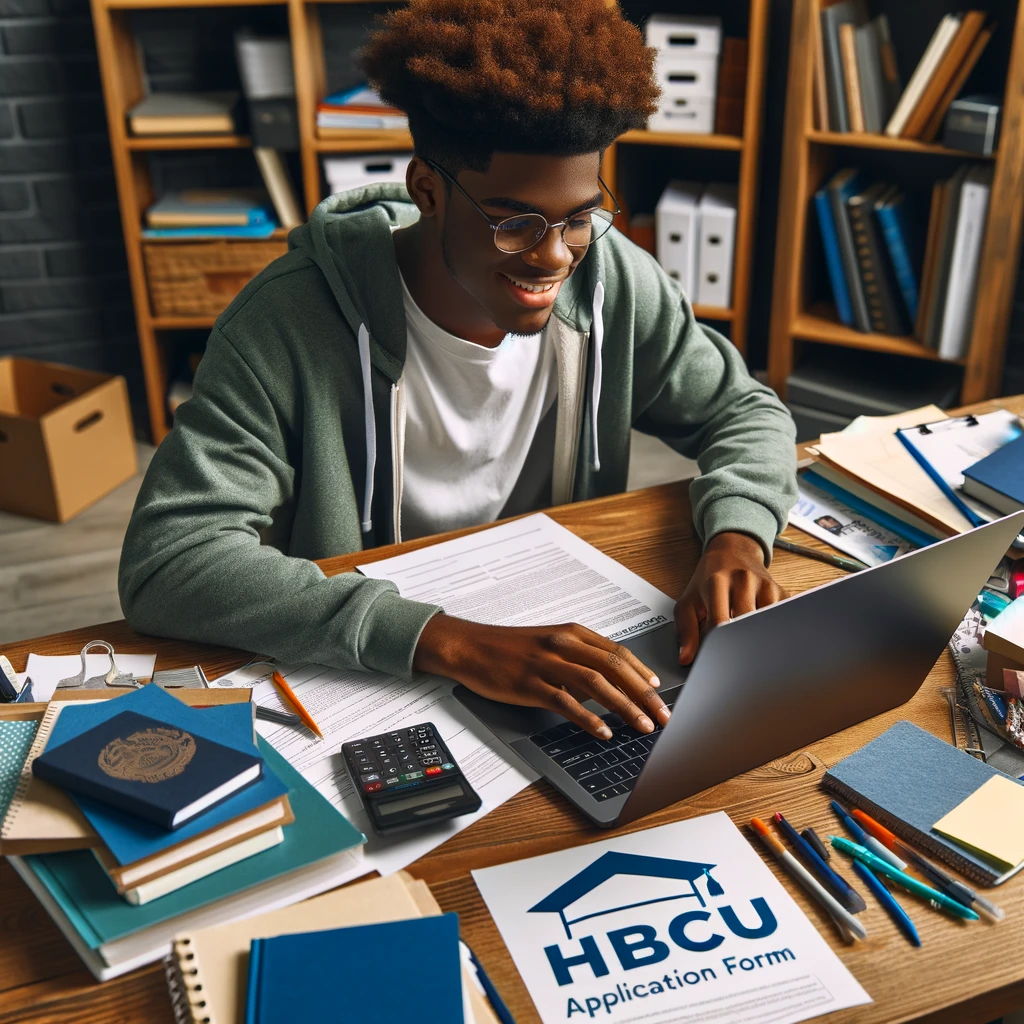
Applying to Historically Black Colleges and Universities (HBCUs) can be an exciting yet daunting process. Understanding the application requirements and deadlines is crucial to ensure a smooth and successful application experience.
1. Research and Choose the Right HBCU With over 100 HBCUs to choose from, it’s important to find the one that aligns with your academic goals, interests, and values. Consider factors such as location, campus culture, available majors, and financial aid opportunities. Visiting campuses and attending virtual tours can also provide valuable insights.
2. Understand the Application Requirements Each HBCU may have different application requirements, but most will require the following:
- Completed application form
- High school transcripts
- Standardized test scores (SAT/ACT)
- Letters of recommendation
- Personal statement or essay
Be sure to check the specific requirements for each HBCU you are applying to and adhere to their deadlines.

3. Highlight Your Unique Qualities HBCUs value diversity and individuality. Use your personal statement or essay to showcase your unique experiences, achievements, and aspirations. Highlight your involvement in extracurricular activities, leadership roles, and community service. This is your chance to demonstrate why you would be a valuable addition to the HBCU community.
4. Seek Financial Aid and Scholarships Many HBCUs offer generous financial aid packages and scholarships. Complete the Free Application for Federal Student Aid (FAFSA) early and explore scholarship opportunities specific to HBCUs. Contact the financial aid offices of the schools you are interested in to inquire about available resources.
Conclusion Navigating the HBCU application process requires careful planning and preparation. By researching your options, understanding the requirements, and showcasing your unique qualities, you can increase your chances of being admitted to an HBCU that will help you achieve your academic and personal goals.
-
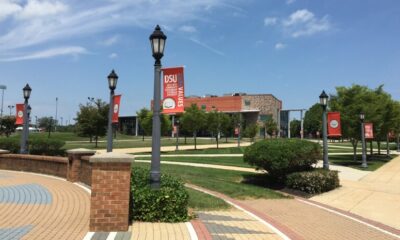
 Campus5 months ago
Campus5 months agoDiscovering Heritage and Excellence: A Journey through Delaware State University’s Iconic Campus
-

 Campus5 months ago
Campus5 months agoEmbracing Tradition and Innovation: A Tour of Lincoln University’s Historic Campus
-

 Campus5 months ago
Campus5 months agoA Day in the Life: Exploring Campus Culture at HBCUs
-

 Campus5 months ago
Campus5 months agoA Journey through Morgan State University’s Storied Campus
-

 HBCU ORIGINAL4 months ago
HBCU ORIGINAL4 months agoExploring Excellence: A Journey Through Bowie State University’s Historic Campus
-

 Events4 months ago
Events4 months agoBiden campaign working to turn its HBCU support into electoral support
-

 Campus3 months ago
Campus3 months agoUnveiling Heritage and Excellence: Exploring Virginia State University’s Timeless Campus
-

 Campus4 months ago
Campus4 months agoCoppin State University’s Historic Campus
